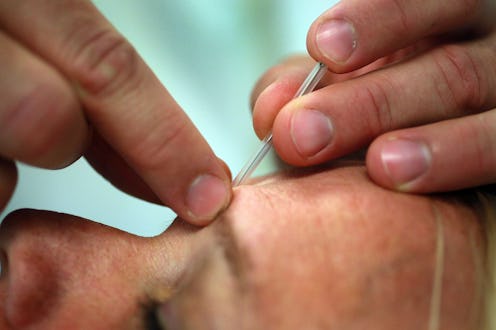Life
7 Ways Acupuncture Changes Your Brain, According To Science

Most everyone knows what acupuncture is, but do you actually know how it affects you? The age-old practice has been around for at least two thousand years (and some people believe it is much older than that), and despite any skepticism about its efficacy, the benefits of acupuncture for various health conditions and pain are backed by a large body of scientific research. If you were ever curious as to how and why acupuncture works to combat many chronic health issues, it's because acupuncture can literally change your brain, from its chemistry, to your neurotransmitters, and your response to pain.
"Acupuncture is part of Traditional Chinese Medicine [TCM], which is a whole system approach to health," Dr. Elizabeth Trattner tells Bustle. "Unlike western medicine, Chinese medicine and acupuncture takes into account a patient’s whole being, and we address the entire body — including the physical, emotional and spiritual wellbeing."
Dr. Shari Auth, DACM, LAC, LMT, and acupuncturist at the NYC wellness center Modrn Sanctuary, explains, "One of things that so amazing about acupuncture is its numerous use cases. In addition to being a great alternative to prescription pain medication, it is also good for mental health. In today's busy world, people are turning to acupuncture for relief from stress and anxiety."
And where do all those benefits start out? In your brain, of course. Here are seven ways that acupuncture can change your brain for the better, according to science.
1It Helps Your Brain Release This Molecule
A 2013 study determined that acupuncture can cause your brain to release neuropeptides — molecules that allows neurons and effector cells to communicate — into the central nervous system. In turn, this can help relieve pain and stimulate your body's self-healing process.
2Specifically, It Helps Release Your Brain's Natural Pain Killers
When you think of pain relievers, over-the-counter and prescribed medication is probably the first thing that come to mind. However, our brains naturally produce chemicals, such as endorphins, that can help manage pain, and, acupuncture can actually help your brain produce more of these important chemicals. "Probably the most popular use today for acupuncture is pain. The American College of Physicians (ACP) recommends acupuncture as the first line of defense patients suffering from low back pain," Dr. Auth says.
3It Can Improve Blood Flow Throughout Your Body
Another cool effect of acupuncture happens throughout your body. Dr. Trattner says, "Acupuncture constricts blood vessels, and releases vasodilators," which causes your blood vessels to relax, and in turn, helps reduce both cerebral blood pressure and high blood pressure in your body.
4It Can Help Anxiety
According to a 2013 study published in the journal Evidence-based Complementary and Alternative Medicine, "Acupuncture has clinical efficacy on various autonomic nerve-related disorders, such as cardiovascular diseases, epilepsy, anxiety and nervousness, circadian rhythm disorders, polycystic ovary syndrome (PCOS), and subfertility." Moreover, the researchers of the study concluded that acupuncture can alter neurotransmitters in areas of your brain to stop your autonomic response — which would alleviate symptoms of these nerve-related disorders.
5Acupuncture Can Boost Your Mood
Not only does acupuncture change the way your brain responds to pain, but it can have a positive impact on your mental wellness. "Neuotransmitters [your brain's way of communicating], serotonin, and noradrenalin are all affected by acupuncture, which affect mood," says Dr. Trattner.
Dr. Auth further explains that acupuncture is being used all over the world as a standalone and conjunctive treatment option for depression. She says, "Acupuncture has shown to enhance the effect of selective serotonin reuptake inhibitor treatment, helping the treatment work faster to increase serotonin levels, and restore the immune system."
6Acupuncture Can Sooth Your Brain's Response To Stress
If you're constantly stressed, you may want to give acupuncture a shot, according to Dr. Auth. "Your nervous system is divided between the sympathetic and parasympathetic nervous system. Our sympathetic nervous system is known for 'fight or flight;' when the sympathetic nervous system is on, our blood pressure goes up, as does the body’s stress hormone, cortisol," she says. "Acupuncture can encourage the body to let the parasympathetic nervous system take over — allowing the heart rate to slow down, and blood pressure and cortisol levels to drop."
7It "Blocks" This Body Process To Combat Pain
Though science has proven that acupuncture does release natural pain relievers, some researchers and acupuncturists believe the practice works because it essentially prevents pain from being felt in the brain and spinal cord. "Acupuncture is believed to help control pain via 'the gate theory,'" says Dr. Trattner. "Our nervous system, if hit with too many nerve impulses, will become overwhelmed and close of the smallest pain centers — which carry pain messengers. These 'gates' are believed to close during acupuncture." However, this idea has not been scientifically proven.
Acupuncture is not for everyone, but if you have health conditions that cause pain or chronic stress, it may be worth talking to your physician about adding the practice to your treatment plan.